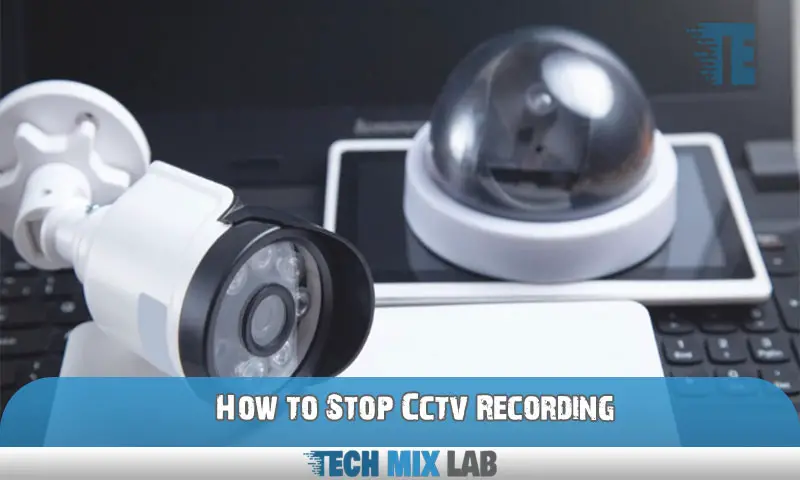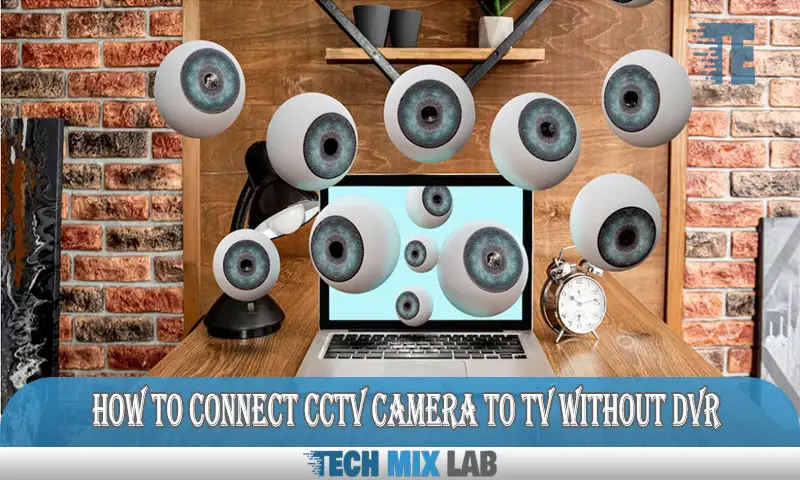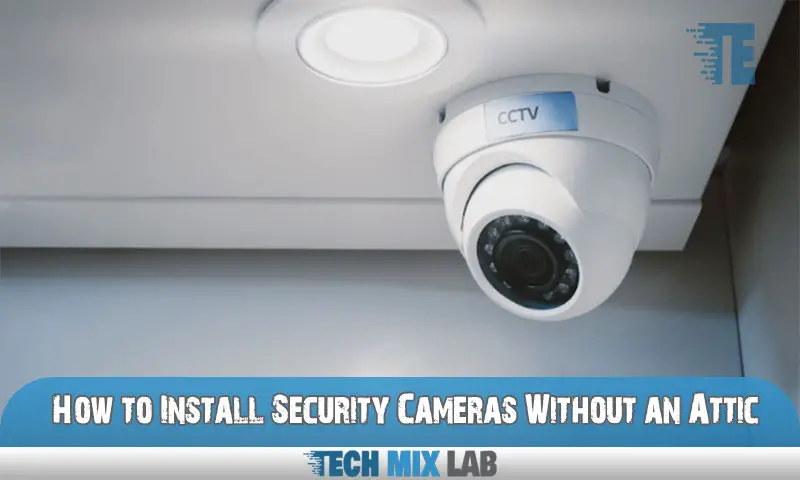To stop CCTV recording, disable the recording feature or disconnect the CCTV camera. CCTV cameras are widely used for surveillance and security purposes.
However, there may be instances when you want to temporarily stop the recording. Whether it’s for privacy concerns or during maintenance, disabling CCTV recording can be done by disabling the recording feature in the camera settings or disconnecting the camera altogether.
By following these steps, you can effectively stop CCTV recording and resume it when needed. We will provide a detailed guide on how to stop CCTV recording to suit your specific requirements.
The Importance Of Stopping CCTV Recording
CCTV, or closed-circuit television, is a system that uses cameras to monitor and record activities. It is commonly used for security purposes, keeping an eye on public places, businesses, and even private residences. While CCTV can be helpful in deterring crime and providing evidence, there may be instances where you want to stop the recording.
It could be due to privacy concerns, legal requirements, or simply wanting to maintain a sense of personal freedom. Whatever the reason, it is important to understand the significance of stopping CCTV recording and taking the necessary measures to ensure your privacy.
By doing so, you can have peace of mind knowing that your actions are not being continuously monitored, allowing you to maintain control over your own personal space.
Legal Considerations For Stopping CCTV Recording

Stopping CCTV recording requires a thorough understanding of the legal considerations and the local regulations in place. By familiarizing yourself with the legal framework, you can ensure that you are following the correct procedures and avoiding any potential legal issues.
It is important to research and comprehend the specific laws and regulations that apply to your location. This may involve studying local legislation, consulting with legal professionals, or reaching out to authoritative sources. By doing so, you can ensure that you are acting within the boundaries of the law and protecting the rights and privacy of individuals.
Additionally, staying up to date with any changes or updates to the legal framework is crucial to ensuring ongoing compliance.
Physical Solutions To Stop CCTV Recording
To prevent CCTV recording, you can use physical solutions such as blocking the camera lens or disconnecting the recording device. One option is to obstruct the lens by placing a physical object in front of it, like a piece of cloth or tape.
This will render the camera useless, as it won’t be able to capture any footage. Another method is to disconnect or disable the recording device by unplugging it or turning it off. This will stop the recording process and prevent any further footage from being saved.
These physical solutions can be effective in situations where you want to ensure your privacy or avoid being recorded without your consent. By using these methods, you can take control and stop CCTV recording.
Digital Solutions To Stop CCTV Recording
Digital solutions can help you stop CCTV recording by hacking into the system or jamming the camera signal.
Using Anti-Surveillance Devices To Stop CCTV Recording
Anti-surveillance devices offer a solution to stopping CCTV recording. These devices work by disrupting the surveillance technology, preventing the cameras from capturing any footage. They employ various methods, such as infrared lights, lasers, or reflective materials, to either blind the cameras or manipulate their sensors.
The effectiveness of these devices depends on the specific technology being used and the skills of the person deploying them. While some devices can successfully disable CCTV recording, others may only partially interfere or have a limited range. It is important to note that the use of anti-surveillance devices may be subject to legal regulations in certain jurisdictions.
Therefore, it is crucial to understand and abide by the laws governing their use. Overall, anti-surveillance technology provides a means for individuals to protect their privacy and prevent unwanted CCTV recordings.
Privacy Concerns And Ethical Considerations
Privacy concerns and ethical considerations are important when it comes to stopping CCTV recording. Protecting personal privacy rights is a delicate balance with security objectives. It is essential to address the potential infringements on privacy while ensuring the safety of individuals.
Assessing the risks and benefits of surveillance systems is crucial. Implementing stringent regulations and policies can help mitigate privacy concerns. Employing techniques like encryption and anonymization can safeguard personal information. Striking the right balance requires open dialogue and collaboration between stakeholders.
Continuous monitoring and evaluation of CCTV systems are necessary to ensure ethical compliance. By respecting individuals’ privacy rights, we can navigate the evolving landscape of surveillance technology responsibly and ethically.
Steps To Take If You Suspect Illegal CCTV Recording
If you suspect illegal CCTV recording, there are steps you can take to address the issue. First, educate yourself about the signs of illegal recording, such as hidden cameras or unauthorized access to surveillance footage. If you notice any suspicious activities, report the violation to the authorities immediately.
They have the knowledge and resources to investigate the matter further. It is crucial to act promptly to protect your privacy and security. By taking these necessary steps, you can stop CCTV recording and ensure a safe environment. Remember to remain vigilant and raise awareness about the importance of ethical surveillance practices.
Together, we can prevent the unauthorized and unlawful use of CCTV systems.
Alternatives To Stopping CCTV Recording
Stopping CCTV recordings can be achieved through legal options for addressing privacy concerns. This can include utilizing privacy-enhancing technologies to safeguard personal information. By employing these alternatives, individuals can take control of their privacy and protect themselves from unwanted surveillance.
These technologies provide a solution to the invasive monitoring that CCTV cameras may pose. They allow individuals to maintain their personal space while still ensuring their safety and security. It is essential to explore these legal options for addressing privacy concerns and taking proactive steps to protect one’s privacy in today’s digital age.
Utilizing privacy-enhancing technologies can empower individuals to regain control over their personal information and prevent CCTV cameras from recording their every move.
Common Myths And Misconceptions About Stopping CCTV Recording

Stopping CCTV recording is often misunderstood. One common misconception is that simply unplugging the cameras does the trick. However, this only disables live monitoring, not recording. Another myth is that covering the camera lenses will prevent recording. While it may obscure the view, it doesn’t stop the recording process.
Additionally, some believe that disabling power to the recording device is sufficient. Unfortunately, this only halts the recording temporarily, as most systems have backup power sources. It’s crucial to understand the limitations of stopping CCTV recording. While it’s possible to deter recording temporarily, a determined individual can find ways to tamper with or bypass such measures.
Therefore, it’s essential to consider other security measures to complement the prevention of unwanted CCTV recordings. Awareness and education about these misconceptions are vital for effective security strategies.
FAQ
How Do I Stop CCTV Recording?
To stop CCTV recording, follow these simple steps: 1. Locate the CCTV control room or security office where the recording system is managed. 2. Ask the responsible person or security personnel to disable or turn off the CCTV recording. 3. Provide a valid reason for requesting the cessation of recording, such as respecting privacy or dealing with legal concerns.
Can You Disable CCTV Cameras?
Yes, it is possible to disable CCTV cameras. However, tampering with or disabling CCTV cameras without proper authorization is illegal and punishable by law. CCTV cameras are installed for security purposes to monitor and record activities in public spaces or private premises.
Can CCTV cameras Record When They Are Turned Off?
No, CCTV cameras cannot record when they are turned off. CCTV cameras need power to function, so when they are switched off, they are not able to record any footage. The recording capabilities of CCTV cameras are dependent on the power supply and the proper functioning of the equipment.
Conclusion
Implementing effective strategies to stop CCTV recording is crucial for maintaining privacy and security. By following the steps outlined in this blog post, you can take control of your personal and professional spaces. Start by understanding the laws surrounding CCTV recording in your area and assessing whether any unauthorized cameras are in operation.
Next, take proactive measures, such as installing CCTV blockers or privacy films, to protect yourself from unwanted surveillance. Regularly inspecting and maintaining your own CCTV system is also important to ensure that it is operating correctly and securely. Remember to always respect the privacy of others and communicate openly about any concerns regarding CCTV recording.
By taking these steps, you can safeguard your privacy and maintain a sense of security in an increasingly monitored world.





